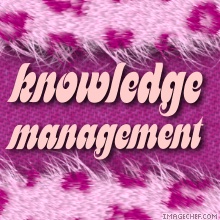What is Knowledge ?

Macquaire dictionary defines knowledge as a body of truth/facts accumulated by human being in the course of time. The same dictionary also defines knowledge as acquaintance with facts, truths or principles from a study or investigation. Truth is the most important concept in defining knowledge. Immanuel Kant subdivided truth into two categories namely analytic truth and synthetic truth. Epistemology is concerned with the theory of knowledge. It subdivides knowledge into two parts namely empirical or a posteriori knowledge and a priori knowledge. A priori knowledge is gained from reason alone, hence consists of statements that are known to be true and therefore consists of analytic truth. A posteriori knowledge is derived from experience hence does not contain analytic truth but truth derived from observation, experimentation, etc.. Epistemologists broadly fits into three schools:
Antopoetic School -- knowledge belongs to individuals, thereby according to this school information which is mere data in context needs to be interpreted according to individuals internal mental model.
Cognitivist School -- Collection and central dissemination of knowledge as the main knowledge development activity.
Connectivists School -- Believes that knowledge does and can reside in a team and in the interaction within the team hence communication and flow of information is the focus here.
Knowledge Management preachers and practioners generally reside either in cognitive or connectivist school. And the focus is rather on the generative part of knowledge and not so on the regulative aspect of it. Hence their definitions are much more lucid and less rigid then epistemologists. Before we go for a definition we need to distinguish between data, information and knowledge.
Data --'A set of discrete, objective facts existing in symbolic forms that have not been interpreted' ( Davenport and Prusak 1998), but which can be 'shaped and formed to create to form information'(Laudon and Laudon 1998)
Information -- Data when enriched by adding context to it may become information as information is simply data 'in formation' (Brown and Duguid 2002) which has 'been shaped by humans into a meaningful and useful form'(Laudon and Laudon 1998). Information is thereby data with a message hence consists of a receiver and a sender. Information results in a action which allows data to be applied to a specific set of circumstances and to be employed effectively. Therefore data becomes information only after the receiver has interpreted it. This makes information descriptive. This enrichment of data to information is a typical know how process which results in the understanding of relationship and patterns. But this information is just descriptive and requires additional context to be used to predict an outcome.
Knowledge -- Information as described above becomes knowledge after it has been examined and compared to other information or data and is then applied to describe, predict or adapt to a situation (Kock, McQueen and Corner 1997). Thus to become knowledge a 'know how and why' enrichment is required.
The literature on Knowledge Management provides many definition of knowledge most of which develop their concept from data to information and then knowledge. Some authors even expand this definition to take into account understanding and wisdom. To put it simply, knowledge does not simply exist it begins as raw facts and numbers. When put into context, this data becomes information such as the content of various documents. This information becomes knowledge only after it is combined with experience and knowledge(Kidwell, Linde, Karen and Sandra 2000).
Knowledge Typologies
Knowledge management theorists typically delineates between TACIT Knowledge, IMPLICIT Knowledge and EXPLICIT Knowledge. A divide into human, social and structured knowledge. My objective as far as knowledge management is concerned is to make available to the user both implicit and explicit knowledge.
Tacit Knowledge -- Understanding gained by people by the integration of values, perception and personal belief with experience i.e. personal context specific knowledge which enables individual to perform well but not easy to formulate, articulate and record.
Implicit Knowledge -- Like tacit knowledge it is owned by the person but allows others to use it.
Explicit Knowledge -- It is that part of knowledge which can be codified, transmitted in a systematic and formal language.
Knowledge Management
Knowledge management is a systematic approach towards managing intellectual assets and other information in a way that provides the company or organization with a competitive edge. Thereby it is a deliberate systematic business optimization strategy that selects, distills, stores, organizes, packages and communicates information essential to the business in question in a manner that improves employees performance, thereby enabling to achieve overall corporate competitiveness. According to Prusak, Knowledge Management is "any process or practice of acquiring, capturing, sharing and using knowledge, wherever it resides, to enhance learning and performance in an organization".
Today we live in a "knowledge age" (Drucker, Peter 1993) and this economy is based on knowledge exploitation [i.e. turning something into practice account] (Kermally 1997). So it is all about capturing existing knowledge, modifying it according to the needs to get the competitive advantage. Thus basically its a filed much like our nation where unity exists in diversity. That is its a field which is very interdisciplinary nature but the over reaching objective is more or less the same to attain competitive advantage with best use of knowledge domain.
The central idea is that knowledge itself cannot be managed but if organizations unite their holons(Koestler 1967: A holon is an identifiable part of a system which has a unique identity yet is made up of subordinate part of the larger whole) with a common purpose and focus on individual and organizational productivity, knowledge is enabled.
Evolution of Knowledge Management
Since antiquity organized business has been working towards attaining competitive advantage that would allow it to serve its customers efficiently. Beginning 15000 years ago selected knowledge of merchants, artisans, physicians etc. were kept as written documents. Thus we see the beginning of the development of knowledge base for the society. In Mesopotamia about 5000 years ago people began to loose track of these thousands of backed clay tablets -- the solution was the development of institution of knowledge management the library. These centralized center soon became the focal point of attack by the intruders or rather the target of military conquest. Even though war had the effect of spreading writings and drawings to new cultures but access to information was restricted to political and religious leaders. Things improved for the public in the west a little over 5 centuries ago, with the invention of move-able type and printing press. With Renaissance and prosperity came the literate class and practice of printing in the local language [common tounge].
In the world of commerce the expertise of many professional continued to be passed on through apprenticeship. This picture changed with the introduction of assembly line as the method of production. To some extent industrial revolution was made possible owing to rows of machine and not because of transfer of oral and written tradition. These row culture provided easy breakup enabling specialization resulting in rise in productivity. Which thereby resulted in various economic condition as interpreted and foreseen by various intellectuals like industrial reserve of army {Marx}. What is important here is that knowledge of the overall process and how individual workers contributed were closely held by a handful of assembly line designer and senior management professional. Still it is the more or less same practice in this era of service economy.
Stages of Progress of Knowledge Management
Though there exists no such unanimity among the practioners of knowledge management professional and scholars I personally feel it can be arranged into three generation:

